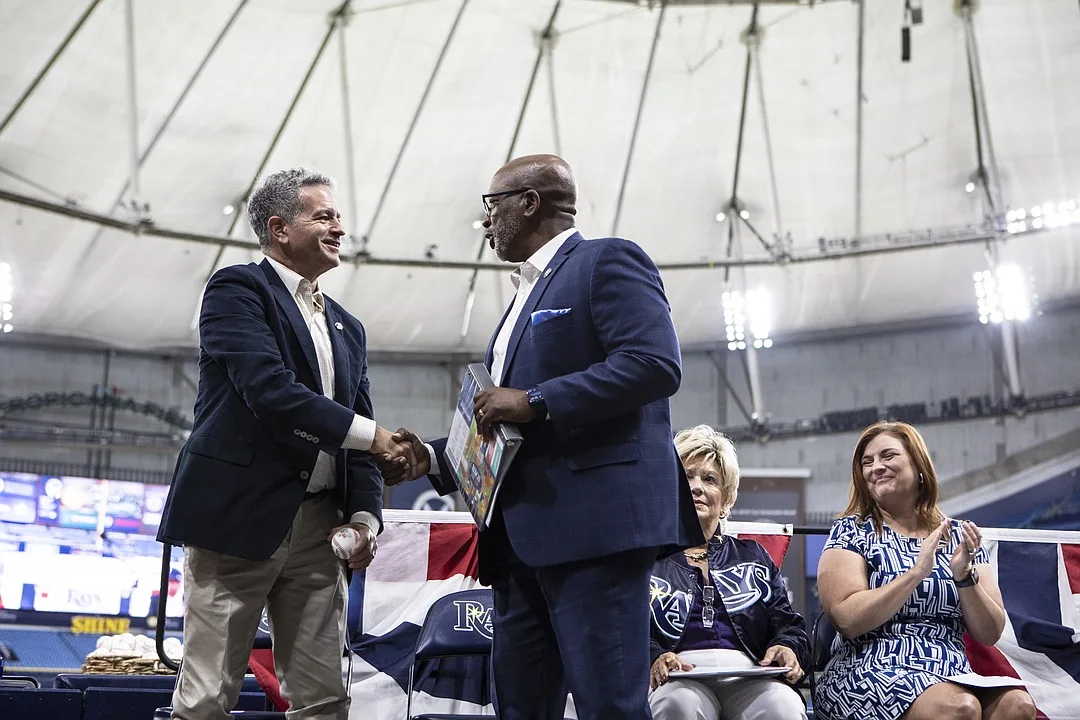
The Tampa Bay Rays on Tuesday officially unveiled plans for a new $1.3 billion stadium that will be built with about $600 million in funds from the city of St. Petersburg and Pinellas County and at least that much from the team.
The plan, which will keep the Rays in the city for at least the next 34 years and a settle a more than a 15 year effort to find it a permanent home, calls for the 30,000 seat, domed stadium to be built near where Tropicana Field stands today. Construction on the ballpark is expected to begin in late 2024 and to be completed in time for opening day of the 2028 season.
“Major League Baseball is here to stay. Right here,” Rays owner Stuart Sternberg said at Tropicana Field on Tuesday.
“It has not been an easy road. While our commitment to remain in Tampa Bay has been steadfast, the journey has been a bumpy one. Eighteen years ago, one of the first things I said upon becoming the owner of the then Devil Rays was that we wouldn’t be playing at Tropicana Field in 2027. Well, I was certainly wrong about that.”
The stadium will be a part of a new $6 billion multiuse development that is expected to bring housing, businesses and life to the 86-acres Historic Gas Light District that will in one way completely transform the area and in another restore a historically Black neighborhood lost when Tropicana was built. The plan calls for a percentage of minority contractors to be hired and for there to be 1,200 affordable housing units.
That new development, which will be built by the team and its development partner Hines, is a large part why the organization says this plan will work when several others have failed in years past. The main difference is that rather than just building a ballpark, the development project is expected to create the type of destination where fans will come to before games and stay after as well as offer the kinds of shops, restaurants and housing that attracts people — and their money — year round.
“This is a very different time for the Rays and for St. Petersburg and for Pinellas County,” says Matt Silverman, the team’s president.
“We’re a much more mature market, and a much more mature region and a much more mature city. When you look ahead and you think about the next several decades, this is a great place for Major League Baseball. The trajectory of this community is so much greater than it was five years ago, 10 years ago. And all the different arrows are pointing in the right direction.”
While the unveiling of the stadium was treated as a celebration with the motto “Here to Stay” on nearly every surface, the reality is that both the St. Petersburg City Council and the Pinellas County Commission have to sign off on the deal before it becomes official. The county’s $300 million share is expected to come from bed tax revenue. While the city’s portion will come from existing tax revenue and bonds. City officials say there will be no tax increases going to pay for the park.
City and county officials and the team said Tuesday that members of both the government bodies were consulted throughout the process and involved with negotiating the agreement. All expressed confidence publicly that the plan would win approval when it comes up for a vote early next year.
While there invariably will be critics, St. Petersburg Mayor Ken Welch says this deal presented the best opportunity for the city and challenged naysayers to come up with something better.
“One suggestion was just to keep the land. Well, we’ve kept the land for 40 years. But let’s talk about community impact,” he says.
“If you want to 1,200 units of affordable housing. If you want a 30% goal for minority contracting on that $6 billion of investment. If you want those things that we now have an agreement to bring forward, what is the alternative plan to get there? To date I have heard of no alternative plan that will get us there.”
Here are some of the details of the development, the ballpark, the deal and how it will all work:
Ballpark agreement
Estimated cost: $1.3 billion
Public contribution: St. Petersburg and Pinellas County will contribute about $600 million.
Team contribution: Rays will be responsible for more than half the construction funding and all cost overruns.
Ownership: The 15 to 20 acres, which will include the ballpark and two parking garages will be owned by Pinellas which it will lease to the city. The city will then sublease it to the Rays.
Lease: The Rays’ lease will be for 30 years with an option to extend that to 40 years.
Size: 850,000 square feet to 950,000 square feet, with a capacity of about 30,000 (35,000 for special events) on three levels.
Features: Domed and air conditioned with transparent glazing and operable walls to “bring the outside in.”
Timeline
Fourth quarter 2023/First quarter 2024: Public approval process
Fourth quarter 2024: Construction starts on the ballpark and the site infrastructure.
First quarter 2025: Construction starts Phase 1 of the development.
Fourth quarter 2027: Construction of the ballpark and the first phase of the development are completed.
Spring of 2028: Opening day
Development overview
Residential: 4,800 units
Residential affordable/workforce: 1,200 units on and off site
Senior living: 600 units
Retail: 750,000 square feet
Office/medical: 1.4 million square feet
Entertainment/music: 100,000 square feet, including a 3,000 to 4,000 seat concert venue
Cultural/community space: 50,000 square feet, including Woodson African American Museum of Florida
Parking space: 14,000


